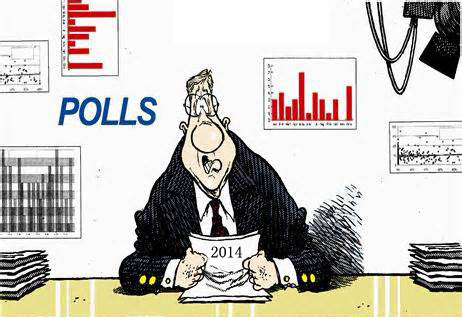Public opinion research seen as way to improve governance

The Internet serves as a convenient channel for the government to learn about public opinion and interact with people, thus improving governance.

An opinion poll is a common means of tracking public opinion, and it is a kind of participatory mechanism that helps people form clear views on social problems.
As China continues its transformation in the 21st century, the study of public opinion is emerging as a crucial means of informing and guiding policymaking decisions.
The study of public opinion is an interdisciplinary field of research that involves political science, journalism, communication, sociology, management and other disciplines.
From 2005 to 2014, 84 projects on the subject were carried out in China, according to the National Planning Office of Philosophy and Social Sciences. Of those, 32 were in the field of journalism and communication, while six were considered political science, accounting for 7.1 percent of the total. This dearth of political research on public opinion demonstrates a need to increase research in the field in order to build a political discourse system with Chinese characteristics.
Yuqing in history
In recent years, Chinese scholars in the field of political science have increasingly recognized the importance of developing core concepts of local politics, stressing the importance of describing Chinese practices in our own words.
As the basic component of political research, public opinion, or yuqing in Chinese, is a manifestation of China’s historical and cultural traditions. The character yu first appeared in the late Spring and Autumn period and it originally referred to vehicles. Afterward, it collocated with ren (people) to mean “the masses.”
Later, there were a few phrases with yuren in them that referred to the views or the speech of ordinary people. The expression yuqing was first employed in an imperial edict in the Tang Dynasty in 897. Since then, it has been used quite frequently. In the Complete Library of the Four Treasuries (Siku Quanshu) compiled in the Qing Dynasty (1616-1911), it is mentioned more than 1,100 times.
This usage reflects the two connotations of public opinion. One refers to public sentiment, while the other demonstrates the views and hopes of the ordinary people. In recent years, phrases such as social and Internet public opinion have often been seen in the Party and government documents.
Though academics have yet to reach a consensus on the exact meaning of public opinion, they agree that the core of the concept is the general population’s thoughts and attitudes, which coincides with the historical definition. In the broad sense, it refers to public thoughts, while in the narrow sense, it is an expression of people’s attitude toward a particular political issue. Ultimately, it is an important strategy for turning the study of political attitudes into the study of public opinion with Chinese characteristics to build a political discourse system in China.
In addition, the abstract theories and methods derived from public opinion phenomena are conducive to strengthening political science in China, such as the study of the expression of public opinion, which is regarded as the origin of political process.
Judging from the main body of public opinion expression in China, bodies within the state institution are numerous and hold higher status, while the relevant nongovernmental organizations are quite rare. As far as the channel for expression is concerned, new media contributes greatly, whereas traditional channels within the state system cannot fully function.
Political science needs to pay extra attention to special phenomena and patterns in China, such as the impact of accumulated Internet public opinion, also known as a “public opinion snowball,” on policy agenda. Other important topics include the complementary effect of public opinion support and crisis on the study of political stability and legitimacy as well as the preliminary summary of the newly established “social public opinion collection and analysis mechanism” on political communication theory and the technical support public opinion indicator and prediction research provided to government performance evaluation and public administration.
Popularization
By examining the development of Western political science, it is easy to see that the discipline needs to further expand in terms of being philosophical, scientific and popular with the people. Only by thriving in all three aspects can the discipline truly mature.
First, for academic reasons, the study needs to be philosophical to delve deeply into political agenda and values. Second, it needs to be scientific because the political ideal must be tested in practice to determine its feasibility. In other words, research should focus on providing scientific analysis of political issues. Lastly, it requires acceptance of the general public so that academic achievements can enter into public discourse, thus guiding their participation in political activities.
Political science in China needs to explore these three aspects, especially the popularization of the discipline. In reality, political theories are not urgent matters of public concern while political science lacks innovative interaction with socioeconomic activities. Consequently, in addition to further strengthening the construction of academic norms, political science needs to develop a kind of “citizen politics” dedicated to educating the public about political philosophy, common sense, rights, participation and means of interacting with the government in order to advance social progress.
Public opinion has a huge edge in promoting the popularization of political science if one considers that it studies the relationship between people and government. While emphasizing the importance of respecting people’s voices and regulating government behavior, public opinion shoulders the responsibility of guiding people to engage in orderly and reasonable political participation. It also advocates consultation through peaceful dialogue to avoid extreme mass disturbances and populism in society.
An opinion poll is a common means of tracking public opinion, and it is a kind of participatory mechanism that helps people form clear views on social problems, which in turn enables policymakers to better grasp social political psychology and come up with scientific methods for making optimal policies. In the meantime, polls can also provide information for the public, affect media reports and subtly alter people’s views on social issues while training people to adopt diverse perspectives on public affairs and shaping their rational participation.
New platform to view China
First, public opinion research can enrich the political discourse between China and the West. Take the concept of yuqing as an example. It contains Chinese features and also echos the popular concept of “polling” in the West. In Western politics, public opinion research carries weight, and many prominent political scientists are devoted to it.
Some scholars conducted a quantitative analysis of thousands of English essays published from 1998 to 2014 and found that the terms “participation,” “politics” and “democracy” appeared many times, demonstrating the importance of this emerging field in political science. It is important to promote public opinion study in China so that there is an effective platform for academia, media and government communications.
Second, public opinion research will increase the affinity of Chinese political discourse. The subject of study is ordinary people’s views on public affairs, which includes both their satisfaction and acceptance of the reform as well as their criticisms and expectations.
Effective theorization not only presents the mentality of Chinese society, revealing the motivation of China’s reform and opening up but also reflects its demands in the era of rapid social development, building China’s image. It can be said that objective analysis of people’s value demands at different levels is in line with fostering political culture and providing a theoretical foundation for political process in China.
Lastly, public opinion research will promote the recognition of China’s democratic performance in the international community. Publich opinion study in the West attaches great importance to quantitative research that examines the linkages between policy changes and public opinion. Strengthening quantitative reasearch in China will help introduce the positive outcomes of the socialist democratic politics with Chinese characteristics to the world. Furthermore, it provides some empirical evidence for the Chinese political process on the sideline, which in reality stresses “people-oriented” democratic politics and promotes the great rejuvenation of the Chinese nation.
Yu Jiaqi is from the Institute of Public Opinion and Sentiment at Tianjin Academy of Social Sciences.

 PRINT
PRINT CLOSE
CLOSE